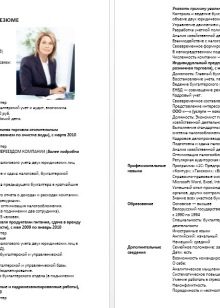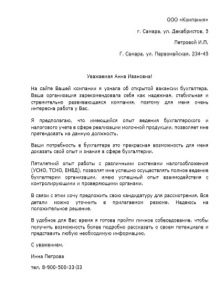Responsibilities of an accountant for a resume

Any business requires an accountant, be it a large corporation or an individual entrepreneur. The responsibilities of the person holding this position are quite varied and directly depend on the scope of the enterprise and the size of the staff. Let's dwell on the specifics of the accountant's work and the area of responsibility in different areas.

Features of the position
An accountant is a specialist who is responsible for accounting, he is engaged in document management, sending tax and statistical reports to the appropriate authorities. Like any other profession, working as an accountant has its advantages and disadvantages.
The advantages include certain points.
- The accountant was and remains a demanded specialty. Highly skilled workers are required in all industries and every organization needs.
- Stable income. Moreover, it directly depends on the work experience and professional category of the employee. The chief accountant of a reputable company can earn quite impressive sums. On average, the salaries of accountants are above the average in Russia.
- Office work, requires constant presence at the workplace, with the exception of rare visits to banks and regulatory structures.
- For experienced professionals, open very good career prospects.
- Accountant if necessary can always work remotely on freelance, taking the accounting department of several small firms.
However, the disadvantages are quite significant:
- a very wide range of functional responsibilities;
- frequent processing, especially during the period of submitting quarterly and annual reports;
- the presence of stressful situations;
- a high level of personal responsibility to the management of the company and regulatory authorities for mistakes made in the preparation of financial statements, and the responsibility is not only administrative, but also criminal;
- the accountant cannot go on vacation at any time convenient for him, in particular, no one will let him go during the preparation and submission of reports;
- the work is complex, monotonous, associated with numbers and constant paperwork;
- any accountant must constantly improve his competence.

Job responsibilities of an accountant in different directions
In small companies, one accountant keeps all the accounting of the company, but in large enterprises there is a whole department in which specialists share the area of professional responsibility.
Accountant-economist
The tasks of an accountant-economist include:
- assistance to the program for the implementation of the economic strategy of the enterprise;
- development and introduction of their own innovative ideas and methods of their implementation in practice in order to improve the FED.
Within the framework of the tasks set, an accountant-economist is engaged in the following work:
- introduction of the financial and economic component of the enterprise FED analysis system;
- development of long-term and short-term measures aimed at improving the company's position in the market of services provided, as well as optimizing the company's financial performance;
- participation in the creation of a set of measures, the main task of which is to improve the performance of the company as a whole;
- ensuring the correctness of the introduction of data on the company's activities into automated accounting systems;
- provision of internal and external documentation at the first request of authorized persons.

Leading
The leading accountant of the firm is entrusted with the functions of an assistant to the chief accountant:
- execution of basic work on keeping records of fixed assets, as well as commodity and monetary values, sales of products, results of FED, settlements with counterparties;
- participation in organizing events aimed at more efficient use of company resources and improving financial discipline;
- acceptance of primary documents for certain areas of accounting, control over them and preparation for processing;
- reflection of all necessary financial transactions on the relevant accounts;
- identifying the reasons for the formation of losses, as well as non-production costs, making proposals for their minimization and prevention;
- the implementation of the calculation of the necessary taxes and fees, as well as contributions to extra-budgetary funds;
- providing company managers, as well as investors, auditors and creditors with correct data on the relevant accounting areas;
- participation in the company's AHD in order to identify the company's reserves;
- coordination of the work of a group of performers in the accounting department of the company.

Based on materials
The material desk accountant should deal with:
- calculating the cost of goods / services provided;
- acceptance and processing of primary financial documents;
- reflection of all transactions with fixed assets and materials on the corresponding accounts of the BU;
- calculation of the actual cost of work and goods;
- drawing up the necessary acts of reconciliation with counterparties;
- preparation of all necessary reports;
- supervising issues of accounts payable;
- an inventory of materials owned by the company;
- storage and documentation.

The main
This is a specialist whose activities cover all areas of accounting. His responsibilities include:
- assessment of primary documentation for compliance with legal requirements;
- analysis of BU accounts for the accounting of mutual settlements with the counterparties of the enterprise;
- reconciliation of data with the IFTS;
- monitoring of the status of receivables;
- payroll;
- submission of reports to tax authorities;
- control over compliance with the financial side of contracts;
- control over the correct reflection on the accounts of all conducted financial and business transactions;
- if necessary - preparation of a package of documents for deductions from the shortfall salary;
- formation of reports for the management office of the enterprise;
- submission of quarterly reports to off-budget funds;
- control over the maintenance of the cash book;
- timely reflection in accounting of all shortages and surpluses in the cash desk;
- audit of primary cash documentation;
- checking the correctness of the formation of the sales ledger and the preparation of advance reports.
In large enterprises, such positions as accountant-cashier, accountant for working with banks and accountant for payroll are distinguished separately.

The duties of the cashier include:
- reception and delivery of cash;
- collection of proceeds;
- acceptance of cash from legal entities and individuals;
- issuing money on account;
- reflection of all operations in the 1C: Accounting system;
- timely filling of the cash book;
- closing of the working day of the cashier-operator.
A bank accountant performs slightly different duties:
- introduction of 51 and 52 accounts;
- work in the "Bank Client" system;
- preparation of a statement on the movement of funds on the current account;
- filling out payment orders and transferring them to the servicing bank.
The payroll accountant is responsible for:
- timely payment of salaries to company employees;
- calculation of the amounts of taxes and payments;
- submission of all necessary reports to extra-budgetary funds;
- distribution of salaries and tax collections among accounts;
- supervising the registration of salary bank cards;
- accounting for reimbursement of expenses for fuels and lubricants, mobile communications, rental housing and other benefits for employees;
- accounting for the payment of alimony and benefits.

Examples of
When writing a resume, it is very important to comply with the following requirements:
- the text must be written correctly, without syntax and spelling errors;
- The entire document should be formatted so that fonts, headings and writing style are consistent;
- for a resume, only the most important information should be given - the length of the document should not exceed 1-2 pages.
Here are some examples of how to write a resume correctly.
Do not forget to write a cover letter in which you state the purpose of your appeal and briefly describe your advantages over other candidates.











